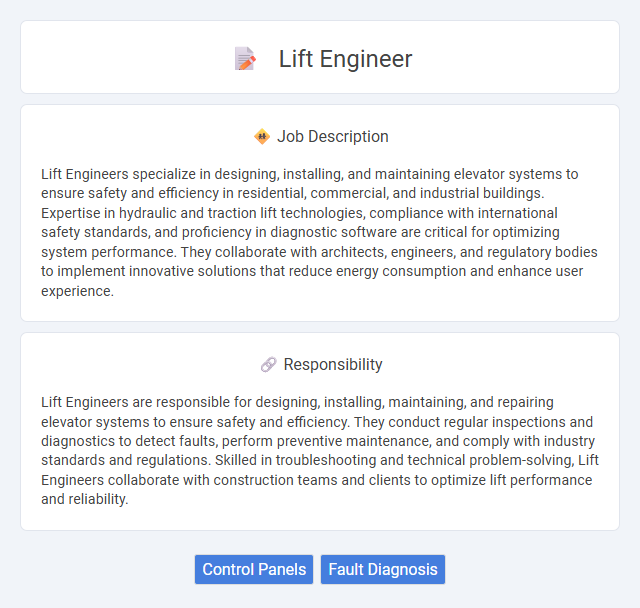
Lift Engineers specialize in designing, installing, and maintaining elevator systems to ensure safety and efficiency in residential, commercial, and industrial buildings. Expertise in hydraulic and traction lift technologies, compliance with international safety standards, and proficiency in diagnostic software are critical for optimizing system performance. They collaborate with architects, engineers, and regulatory bodies to implement innovative solutions that reduce energy consumption and enhance user experience.
Individuals who are physically fit, have good problem-solving skills, and remain calm under pressure are likely suitable for a lift engineer role. Those with a fear of confined spaces or difficulties with technical troubleshooting may find the job challenging. The role probably demands strong attention to detail and the ability to work in varying conditions, which not everyone may comfortably handle.
Qualification
A Lift Engineer typically requires a diploma or degree in mechanical or electrical engineering, paired with certifications such as NVQ Level 3 in Lift Engineering or an equivalent qualification. Extensive knowledge of lift systems, safety regulations, and maintenance protocols is essential for ensuring compliance with industry standards. Practical experience with installation, troubleshooting, and repairs enhances technical proficiency in this specialized field.
Responsibility
Lift Engineers are responsible for designing, installing, maintaining, and repairing elevator systems to ensure safety and efficiency. They conduct regular inspections and diagnostics to detect faults, perform preventive maintenance, and comply with industry standards and regulations. Skilled in troubleshooting and technical problem-solving, Lift Engineers collaborate with construction teams and clients to optimize lift performance and reliability.
Benefit
A Lift Engineer probably experiences significant benefits including competitive salaries and opportunities for career advancement within the engineering sector. They may also gain hands-on expertise in maintaining and installing advanced lift systems, which enhances their technical skill set. Job stability is likely, given the ongoing demand for safe and efficient vertical transportation in residential and commercial buildings.
Challenge
A Lift Engineer likely encounters complex challenges in diagnosing and resolving mechanical and electrical issues within elevator systems. Troubleshooting unexpected malfunctions under time constraints may require advanced technical knowledge and problem-solving skills. Adapting to evolving safety regulations and integrating new technologies could present ongoing professional demands.
Career Advancement
Lift Engineers specializing in the design, installation, and maintenance of elevator systems experience strong career advancement opportunities through certification and continuous technical training. Mastery of advanced control systems, safety regulations, and project management enhances prospects for leadership roles such as Senior Lift Engineer or Systems Consultant. Employers highly value professionals who integrate cutting-edge technologies like IoT-enabled lifts, positioning them for executive positions in building services and infrastructure companies.
Key Terms
Control Panels
Lift Engineers specialize in designing, installing, and maintaining control panels that regulate elevator operations, ensuring safety and efficiency. Expertise in PLC programming, electrical schematics, and system diagnostics is critical for troubleshooting and optimizing lift control systems. Proficiency in compliance with international lift safety standards and integrating smart control technologies enhances system reliability and user experience.
Fault Diagnosis
Lift engineers specialize in fault diagnosis by using advanced diagnostic tools and software to identify mechanical or electrical issues in elevator systems. They systematically analyze error codes, sensor data, and operational logs to pinpoint malfunctions and ensure timely repairs. Expertise in fault diagnosis minimizes downtime and improves elevator safety and performance.
 kuljobs.com
kuljobs.com